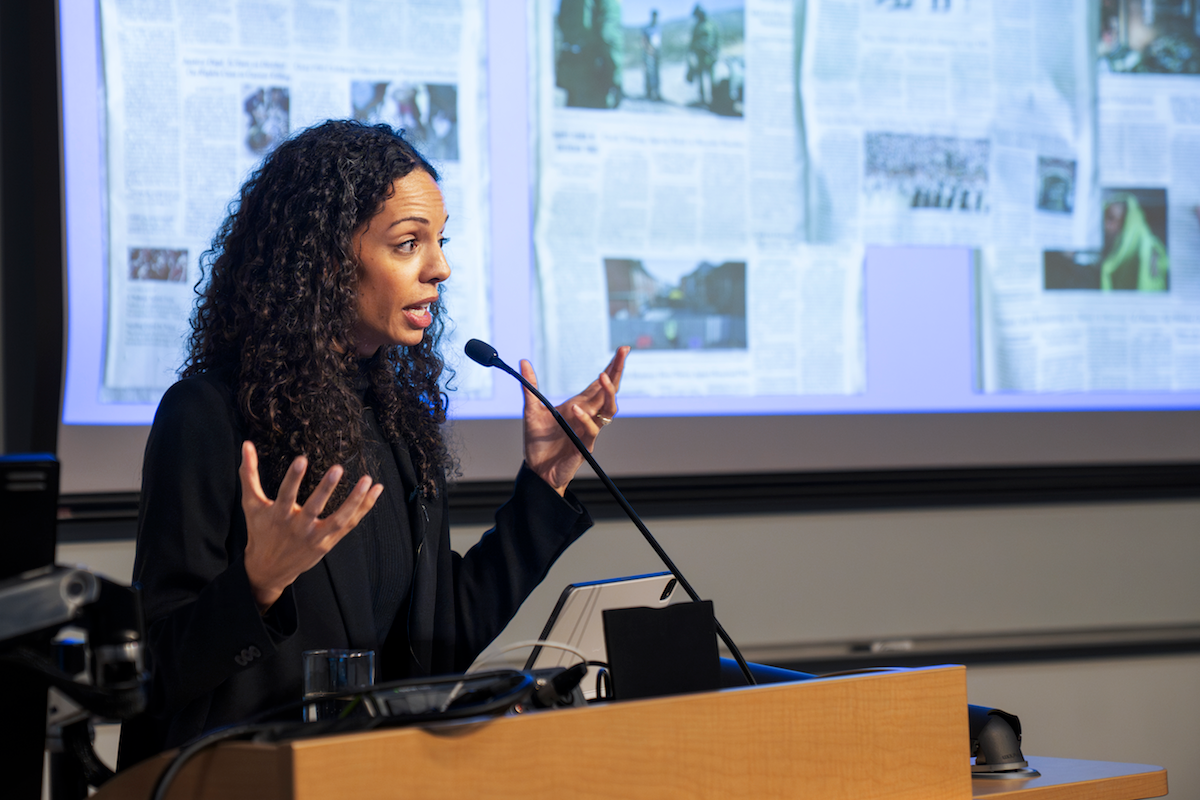KINGSTON, R.I.—Nov. 7, 2023—Pulitzer Prize-winner Caitlin Dickerson says it was around the time she cast her first vote in an election that her future as an investigative reporter started to come into focus.
During that time, Dickerson told an audience in the University of Rhode Island’s Swan Hall, she started thinking about the importance of accurate information to the choices voters make—and how working people simply don’t have time to dig up that information on their own.
“It’s not like you can call up the Department of Justice and say, ‘Hey, I remember that Congress appropriated [several] billion dollars to you last year. What did you end up spending that on?’” Dickerson said. “That’s not something that most people can do, so I decided that my role in our democracy was to take on this job of being an informer.”
On Wednesday, Nov. 1, Dickerson discussed that role as the featured speaker for the annual Taricani Lecture Series on First Amendment Rights. During a 90-minute lecture and question-and-answer period, Dickerson discussed the importance of objective investigative journalism in the modern world, as well as her Pulitzer Prize-winning work revealing the truth about the U.S. government’s policy of separating migrant children from their families at the southern border.
Like many of her stories, Dickerson said the family separation story started with a tip. She heard from a government source that the U.S. Department of Homeland Security was considering family separation as a way to deter people from attempting to cross the border. Those sources presented the idea as something they thought was outrageous, but Dickerson was able to confirm that the plan had reached the desk of Homeland Security Secretary Kirstjen Nielsen for consideration.
After Dickerson’s front-page story in The New York Times about the proposed policy, reports began trickling in that separations were already happening. Yet government officials denied those reports were true and that such a policy was in place.
Those flat denials were a surprise to Dickerson. Normally, she says, government officials will do one of three things when faced with a question they’d rather not answer: They refuse to comment, offer additional information that helps to place the issue in context, or attempt to misdirect the reporter by offering an alternative issue to discuss.
“That’s what you get as an investigative reporter,” Dickerson said of those stock responses. “What you don’t [normally] get is a lie. That’s not how this country works. It doesn’t matter who’s in office. Partisanship aside, there’s an expectation in this country since it was established that we need a free and fair press with access … to information.”
Dickerson persisted and was finally able to confirm that separations were indeed happening. After another front-page story in The Times, the Trump administration finally announced the policy publicly. Amid a fierce blowback, Nielsen eventually resigned as secretary of homeland security. Dickerson stayed with the story, eventually publishing in 2022 a 30,000-word exposé in The Atlantic detailing the policy, its haphazard implementation, and the pain it inflicted on families.
The piece won Dickerson the Pulitzer Prize for Explanatory Reporting. It and other stories about family separation also played a role in a legal settlement the U.S. reached with migrants affected by the policy.
“The lawyers who were involved in that settlement talked a lot about the importance of journalism exposing the truth about what happened,” Dickerson said, “especially when you’re talking about a story that was misrepresented to the public.”
During the question-and-answer session, Dickerson encouraged aspiring journalists to dig for truth.
“Whatever the story you’re working on, it starts with a simple goal: to inform,” she said. A reporter’s job is “to tell readers not what people with a lot of power want them to think is true, but what’s actually true—what’s actually happening.”
As difficult as it might be at times, Dickerson also encouraged would-be investigative journalists to put their opinions aside and follow the facts.
An investigative piece simply doesn’t work if “what you write is laden with your own perspective with not enough fact,” Dickerson said. “Even when the fact defies conventional wisdom, even when it defies what … your reader might prefer, you really have to give it to people straight in order to arm them to participate in our democracy.”
The role of journalism in a functioning democracy remains critical, Dickerson said, even at a time when trust and respect for journalists appears to be waning. “The country needs us,” she said. “Even though they hate us sometimes, they need us.”

